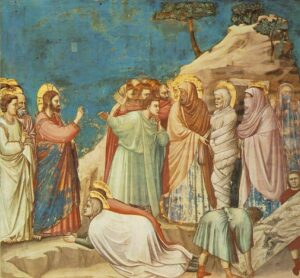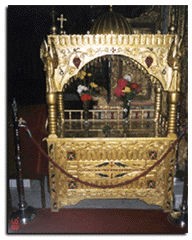Lazarus of Bethany / Saturday of Lazarus (Nuhome d l’ozar) / Saturday Before Hosanna

St. Lazarus, ‘Friend of Christ’ is commemorated on the Saturday before Hosanna, in the Orthodox Church. Lazarus of Bethany is a biblical character mentioned in the Gospel of John11: 1–45. Lazarus (Eleazer-Hebrew) means “God helps.” Lazarus and his sisters Martha and Mary, lived in Bethany, little town two miles outside Jerusalem, south-east of the Mount of Olives. Bethany is currently the Palestinian town of Al-Eizariya, ‘Place of Lazarus’. Lazarus was a good friend of Jesus, as well as the disciples. His sisters, Mary and Martha, were also devout followers of the Lord.
Having completed the forty days that profit to our soul, we are gathered on this day, to the historic biblical town of Bethany, Lazarus’ hometown, in order to celebrate his raising from the dead and the Gospel reading for Lazarus’ Saturday is focused on raising of Lazarus back, to earthly life by our Lord and Savior Jesus Christ. The day and commemoration receive its name from the miracle of Christ recorded in the Gospel. The entire chapter 11 of the Gospel of St John, has a major focus on the family that Jesus loved – Martha, her sister and Lazarus, the death of Lazarus and his resurrection.

Amidst triumph and joy, the Holy Church celebrates, two unique, yet paradoxical feasts, Lazarus Saturday and Palm Sunday as joyous festivals of the Church, before His Passion. Both bears witness to the power of Christ over death and exalts Him as King, as we enter the most solemn holy week of the year, that leads the faithful in remembrance of His suffering and His death and concludes with the great and glorious Feast of Resurrection. These days are not just visible, earthly triumphs, but Resurrectional and Messianic Joy in which Christ, points beyond to an ultimate victory and final kingship, which Christ will attain not by raising one dead man (Lazarus) or entering a particular city (Jerusalem), but by His own imminent passion, crucifixion and resurrection.
When their brother Lazarus became sick and was so sick, everyone was afraid he would die. Mary and Martha sent for Jesus, so He could heal him (John 11: 1-3). Jesus loved Martha and Mary, but when He heard this, He did not rush over to help him. But Jesus stayed where He was, for two more days (Jn. 11: 6). Lazarus, died and his sisters buried him. They must have thought that Jesus had forgotten them. All hope was gone.
Jesus said, “our friend Lazarus is asleep; but I will go, that I may awake him out of sleep“. Jesus said ‘Nevertheless let us go to him’ (Jn. 11: 15). Our Lord and Saviour Jesus Christ did not say: ‘Let us go to console his sisters’ or ‘let us go’ or ‘let us go to Bethany’ rather, He said ‘let us go to him’. When Jesus and His disciples finally arrived in Bethany, amidst weeping, wailing and lamentations, they, learned that Lazarus had been dead four days (Jn. 11: 17). At that time, Jews believed it was not possible to return to life. Martha told Jesus, “If you had been here, my brother would not have died” (Jn. 11:21). Jesus replied, “I am the resurrection and the life’. He who believes in Me, though he may die, he shall live. Whoever lives and believes in Me shall never die” (Jn. 11: 25-26). So, Jesus went to the tomb, prayed to the Heavenly Father and cried aloud, “Lazarus, come forth!” (Jn. 11:43) and the once-dead man came out (Jn. 11: 44). This event, Lazarus’ being raised from the dead, is mentioned only by St John the Evangelist. And this was done so that faithful believe that Jesus is the Son of God and that He was risen, and also that there will be a resurrection of the dead and that death cannot separate the Lord Jesus Christ and His Church from a departed one.

Jesus is the source of both life and resurrection. “I am the resurrection and the life,” There is no resurrection apart from Christ, and there is no eternal life apart from Christ. Jesus confers this spiritual life on those who believe in Him, so that they share His triumph over death (1 Jn 5: 11-12). He declares His divine authority to raise the dead on the last day. Believers in Jesus Christ will experience resurrection because, having the life He gives, it is impossible for death to defeat them (1 Corinthians 15: 53-57), thus confirming and ascertaining a Universal Resurrection.

The living and the departed come together, in Holy Qurbana, glorifying the Holy Triune God. As our Lord commanded, let us go and not forget to remember and pray for our departed ones, who departed in true faith.
“May departed ones receive, Who confessed the Trinity,
What was promised to the thief, Paradise with Thee, O Lord!”
According to one tradition, Lazarus was forced to leave Judea, because of supposed plans of his assassination, soon after the Resurrection of Christ. He then moved to Cyprus, where he was appointed as the first bishop of Kition (modern-day Larnaka), by Barnabas and Paul the Apostle. For the next 30 years, Lazarus stayed there. After his death, he was buried there for the second time. In 890, a tomb was discovered in Larnaca with the inscription “Lazarus the friend of Christ.” The remains of Lazarus were apparently moved from Cyprus to Constantinople in 898.

Another tradition (in the West) believes Lazarus, Mary, and Martha were forced out to sea by the Jews who were averse to Christianity. They were apparently put in a boat without sails or oars. However, they reached a place in Provence that is now known as the Saintes-Maries. The three siblings then separated and went to different regions of south-eastern Gaul to preach. Lazarus went to Marseilles and converted many to Christianity there, eventually becoming the first bishop of Marseille. During the persecution of Domitian, he was put in prison, eventually beheaded in a cave located. He was later buried in a Cathedral, which is now dedicated to Lazarus (Saint Lazare). People in Marseilles claim they still have his head, which they venerate to this day.
Nevertheless, following the Resurrection of our Saviour, Lazarus undertook an apostolic mission which carried him to many corners of the empire. The life of St Lazarus, added considerable luster due to the closeness with the Savior, and extended by a miracle of the Lord, was the deep commitment to Jesus Christ and subsequent mission. It is said that Lazarus, at age 58 departed this earth after having lived a full life.
0 Comments